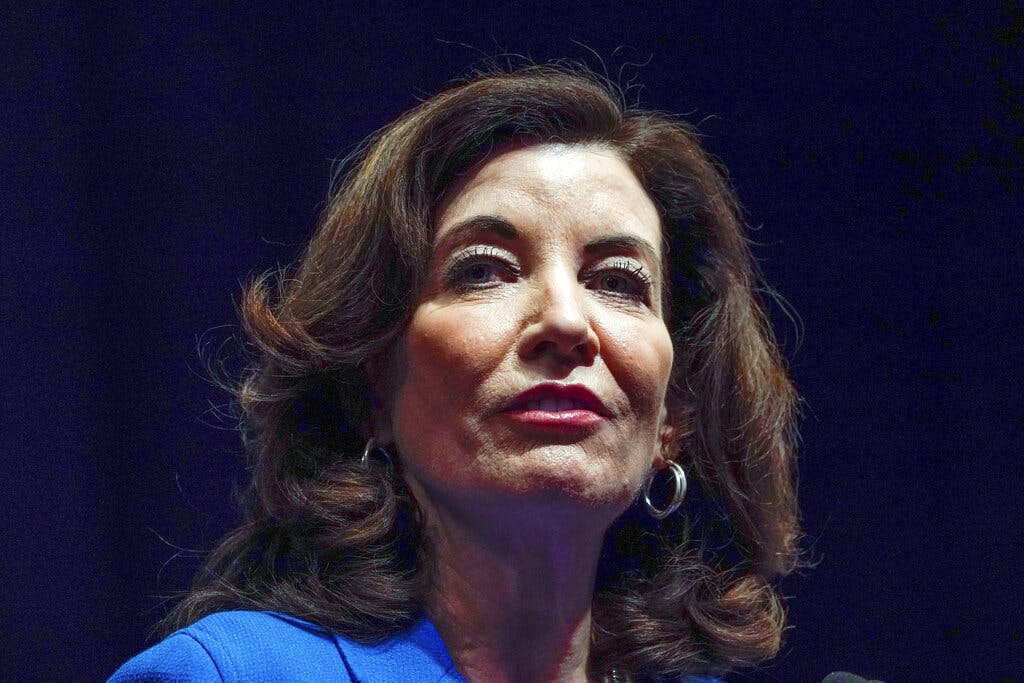Hochul-Backed Bill To Seal Convicts’ Records Seen as ‘Christmas for Criminals’
Some argue that tying the Clean Slate bill to bail reform is unfair and inaccurate.

Republicans are calling it “Christmas for criminals.” A bill backed by Governor Hochul would make it easier for convicts to seal their criminal records, a process currently dogged by nearly unnavigable bureaucracy.
While some have attempted to tie the “Clean Slate” bill to New York’s 2019 bail reform effort, proponents of the new bill contend that such rhetoric misrepresents the content of the legislation.
Broadly, the Clean Slate bill, if passed, would automatically seal the criminal records of people convicted of most misdemeanors after three years and of some felonies after seven years.
Many people convicted of crimes are already eligible to have their records sealed, but it is not automatic and the bureaucratic red tape involved keeps the process out of reach for most.
The bill is intended to make it easier for people to find housing and employment, each of which can be denied to those with criminal records.
The current process is “so time consuming and confusing — it’s costly and they recommend you get your attorney,” an adjunct lecturer at John Jay College of Criminal Justice, Jillian Snider, told the Sun.
The bill is expected to see resistance in the state senate. On April 25 Senator Thomas O’Mara tried to tie the bill to 2019’s bail reform, a central issue in this year’s state-level elections.
“Another day in Albany, another set of pro-criminal policies pushed by one-party rule,” Mr. O’Mara said. “The crisis, caused by Democrats’ cashless bail and other soft-on-crime policies, could be stopped today if they stopped pushing a radical, pro-criminal agenda.”
New York GOP chairman Nick Langworthy told the Sun that Clean Slate “is Christmas for criminals,” adding: “New York Democrats spend their days dreaming up ways to make life easier for criminals while law-abiding taxpayers continue to suffer.”
Polling demonstrates why they might want to tie the bill to crime and the unpopular bail reforms. An April 25 Siena College poll showed that 24 percent of voters and 37 percent of Democrats approve of Ms. Hochul’s handling of crime in the state.
“One-quarter of voters say that crime will be the single most important issue in determining which candidate gets their support for governor in November,” pollster Steven Greenberg said. He said voters “think the 2019 bail law resulted in an increase in crime.”
Those familiar with the bill don’t think that’s an appropriate connection to make or that this bill could lead to an increase in crime.
The managing director of policy for the Bronx Defenders, Scott Levy, argues that tying the Clean Slate bill to bail reform is unfair and inaccurate.
“Clean Slate is not an expungement bill,” Mr. Levy told the Sun. “It seals criminal convictions for civil purposes and, really, Clean Slate is an economic recovery and development bill.”
The bill would make a process that exists in NewYork — sealing of criminal convictions — automatic for those who are already eligible to begin the process.
Once sealed, those with prior convictions would not have to disclose their offenses in most civil matters, such as applying for a job or housing.
Criminal records would remain open for certain purposes, such as criminal trials and applying for concealed carry permits. The bill also does not alter who is eligible to have their records sealed.
Those with convictions for sexual offenses and most violent crimes, including any crime with a weapon or intent to use one, would continue to be excluded.
Mr. Levy noted that the bill enjoys “support from some of the biggest employers in the state including JP Morgan as well as the business council,” and said similar measures have “bipartisan support” nationwide.
The bill is aimed to help people who have served their time and are trying to reintegrate into society, something that is often hindered by a criminal record.
“It’s looking to work for those people that have already paid their debt to society and are looking for a chance to get jobs or housing,” Ms. Snider said.
Mr. Levy notes that “it applies to people who are out in the community” and have stayed out of trouble for years.
Correction: O’Mara is the last name of the state senator. An earlier version of this article included an incorrect last name.

